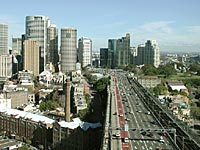Planning
Description
|
Planning is centrally concerned with land-use and related environmental, social and economic activities within a legislative, administrative and political context. Its distinctive approach lies in integration and coordination both of policy development and its implementation, by statutory and other means. It is a process for assisting the public, private and voluntary sectors in making choices about land-uses and related decisions for the conservation and development of land and its resources, in ways conducive to sustaining the natural, economic and social environment of Australia.
Physical, financial, social, legal, cultural, environmental and historical forces all shape these planning processes. For cities, suburbs and regions, planning targets the development, improvement, conservation and general management of the environment. Areas of specialisation include land use planning, social planning, transport planning and regional planning. Undergraduate study in Planning at UNSW will introduce students to planning theory and methodology, sociology, political economy, planning law, transport planning, environmental science, heritage studies, urban design and planning history. Studying Planning at UNSW Planning may be studied at an undergraduate level at UNSW through the Bachelor of Planning degree program (and combined degree programs such as Planning/Law, Planning/Master of Commerce and Planning/Master of Environmental Management). These programs have a compulsory component of 48 weeks of full-time paid employment in a planning position. Planning is also offered for postgraduate students through PhD (Research) and Masters (Research or Coursework) degree programs. Please refer to the table below for a complete list.
Planning can be studied as
|
|||||||||||










